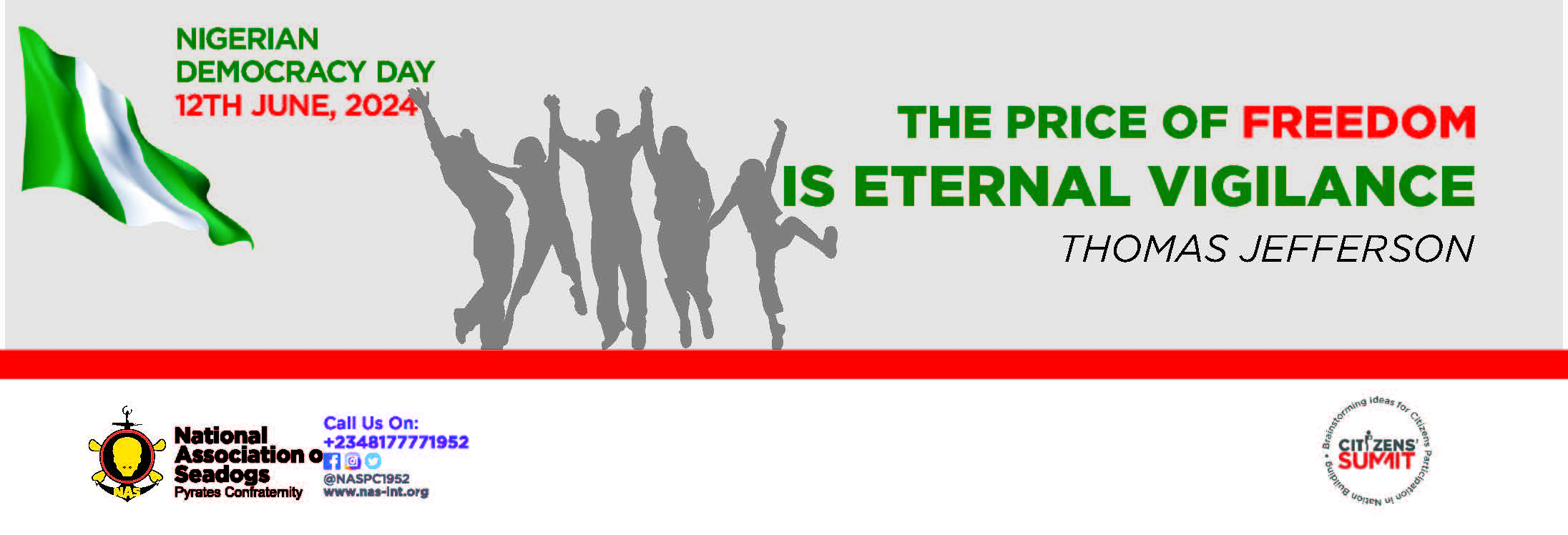STRONG INSTITUTIONS ARE THE BEDROCK OF A RESILIENT DEMOCRACY
June 12 remains a day of profound significance in our nation’s history. It is a day of remembrance of the annulled June 12, 1993, presidential election, widely regarded as the freest and fairest election in Nigeria’s history. It is a day to reflect on Nigeria’s journey since the return of democracy in 1999, assess our progress, and chart a course for a more prosperous future.
The annulment of the June 12, 1993, presidential election by the military regime of General Ibrahim Babangida remains a watershed moment in Nigerian history. Chief Moshood Kashimawo Olawale Abiola, the presumed election winner, represented the hopes and aspirations of millions of Nigerians for a new era of democratic governance. The annulment, however, plunged the nation into political turmoil, leading to widespread protests, civil unrest, and international condemnation. On a hitherto unseen scale, this immediate aftermath unleashed the resilience and determination of Nigerians to assert their democratic rights.
May 29, 1999, marked a new beginning for Nigeria as the country transitioned from military rule to democratic governance with the inauguration of Olusegun Obasanjo as the President. This period was heralded by a sense of hope and renewal. Nigerians looked forward to a future of political stability, economic growth, and social development. The return of democracy brought with it the promise of accountable leadership, respect for human rights, and the rule of law.
The National Association of Seadogs, Pyrates Confraternity, NAS/PC, today joins Nigerians at home and abroad in commemorating this year’s Nigerian Democracy Day. Since 1999, we acknowledged that Nigeria has made significant strides in consolidating its democracy. Regular elections have been held, power has transitioned between civilian administrations, and institutions of governance have been strengthened.
However, the journey has been far from smooth, marred by several critical challenges that continue to undermine the full realisation of democratic ideals.
One of the most persistent challenges has been the conduct of credible elections. Despite reforms and efforts to improve the electoral process, elections in Nigeria have often been characterised by irregularities, including voter intimidation, ballot box snatching, and brazen manipulation of results. These recurring issues erode public confidence in the electoral system and undermine the legitimacy of elected officials.
Corruption remains a pervasive issue that affects all levels of government under Nigeria’s democratic rule. Not even the existence of various anti-corruption measures and the establishment of agencies such as the Economic and Financial Crimes Commission (EFCC) and the Independent Corrupt Practices Commission (ICPC) have been able to mitigate the scourge, as corruption continues to stifle development, hinder effective governance, and perpetuate inequality. Nigeria must intensify its efforts to combat corruption and promote transparency and accountability in public office.
Economic challenges, including rising poverty and unemployment, have also posed significant obstacles to Nigeria’s democratic progress. Despite being Africa’s largest economy, the benefits of economic growth have not been equitably distributed, leading to high levels of poverty and unemployment. For a country with an estimated 200 million people, and a median age of 18, the youths, in particular, face significant barriers to employment, fuelling frustration and disillusionment. Addressing these economic challenges is critical to engendering social stability and ensuring the sustainability of democracy.
NAS/PC for the past seven decades has been at the forefront of advocacy efforts for social development, human rights, and the imperative importance of a secure populace. We fully understand the ramifications of persisting in error by disregarding these critical sectors. Social development is a cornerstone of democratic progress. Access to quality education, healthcare, and social services is vital for the well-being of citizens and the overall development of the country. Unfortunately, Nigeria continues to face monumental challenges in these sectors, with inadequate funding, poor infrastructure, and disparities in access.
Human rights and the rule of law are fundamental to a thriving democracy. While there have been improvements, issues such as police brutality, gender-based violence, and discrimination persist. Freedom of the press remains a pipe dream as journalists remain an endangered species for daring to disseminate uncomfortable truths. It is crucial to address these issues through comprehensive legal reforms, public awareness campaigns, and robust enforcement of laws that protect the rights of all citizens.
The spectre of insecurity remains a veritable concern, with the insurgency and banditry in the North-East, North- West, and North- Central, brigandage and kidnapping in the South-East, South-South, and South-West and communal conflicts affecting various parts of the country. These challenges threaten national unity and the stability necessary for development. Confronting insecurity requires a multifaceted approach, including strengthening security forces, addressing root causes of conflict, and ensuring inclusive governance that accommodates the diverse interests of Nigeria’s population
As we celebrate Democracy Day today, it is essential to look forward with a sense of optimism and a commitment to overcoming the challenges ahead. The future of Nigerian democracy depends on the collective efforts of all stakeholders, including government, civil society, and the citizenry to protect democracy. To safeguard democracy, it is crucial to continue strengthening our democratic institutions. This includes ensuring the independence and integrity of the judiciary, enhancing the capacity and impartiality of the Independent National Electoral Commission (INEC), and promoting a vibrant and free press. Strong institutions are the bedrock of a resilient democracy and are essential for upholding the rule of law and protecting the rights of citizens.
NAS/PC is convinced that civic engagement and political participation are fundamental to a thriving democracy. Nigerians must be encouraged to actively participate in the democratic process, not only by voting but also by holding their leaders accountable. Civil society organisations play a vital role in this regard.
Governments at all levels must also prioritise policies that promote inclusive growth, create job opportunities, and tackle the root causes of poverty, inequality, and insecurity. Improved investments in education, healthcare, and infrastructure are essential to improving the quality of life for all Nigerians and forging a sense of national unity and purpose. The political class must rein in its capacious and outrageous predilection for personal comfort while the teeming citizenry does not earn a living wage, or is grappling with where the very next meal will come from!
We insist, as we have done over the decades, that the fight against corruption must remain a top priority. This requires an altruistic, multi-pronged approach, including enforcing existing laws, strengthening the anti-corruption institutions, and a deliberate insistence on a culture of integrity and accountability. Whistleblower protection and public access to information are also crucial in empowering citizens to expose and challenge corrupt practices.
The role of national unity as a sine qua non for a progressive and prosperous country cannot be overstated. Ethnic, religious, and regional divisions have often been exploited for political gain, leading to conflict and instability. Promoting a sense of national identity and unity, while respecting the diversity of our country, is vital for building a cohesive and resilient nation.
NAS/PC on this Democracy Day, urges one and all to remember the sacrifices of those who fought for our democratic freedoms and renew our commitment to building a better Nigeria. The journey since 1999 has been fraught with challenges, but it has also been marked by resilience and progress. By working together, we can overcome the obstacles that remain, and ensure that democracy delivers on its promise of a better future for all Nigerians.
Abiola Owoaje
NAS Capoon
Abuja


![[PRESS RELEASE] AFFIRMATION OF EMERGENCY RULE IN RIVERS STATE THROUGH “AYES AND NAYS”](https://www.nas-int.org/wp-content/uploads/2025/03/National-Assembly-Ayes-and-Nays-400x250.jpeg)

